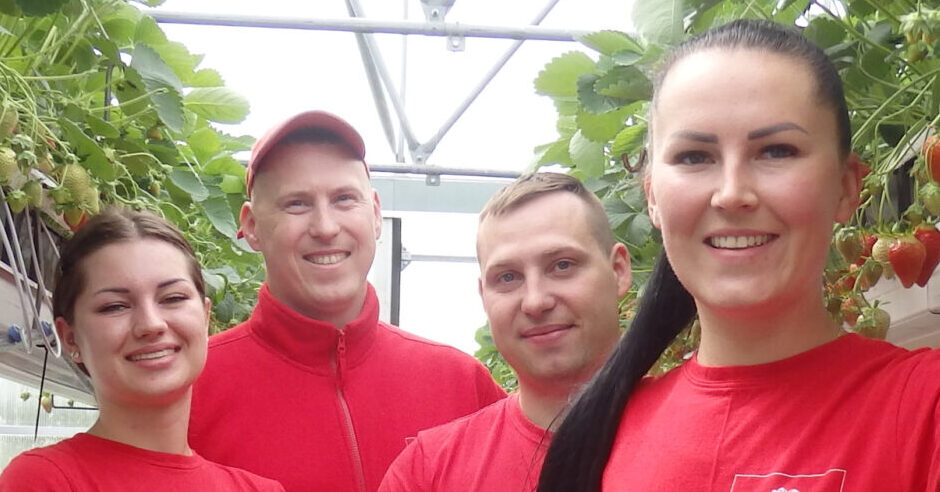The first fragrant strawberries ripened in the greenhouses of Edvins Bagdon’s farm in the village of Jucaičiai, Veivirženiai district, were delivered to buyers last week. At the end of this harvest, those that have germinated in the fields will be harvested. The young farmer who chose berry growing also grows rowanberries and quinces. His plans include expanding the strawberry farm and establishing a processing company.
Shoppers discovered Two Berries
In the spacious greenhouses, which cover 10 acres, strawberries are grown in beds high on the shelves. The early ones are red, sweet, fragrant – last week they harvested the first harvest, several tens of kilograms, and delivered it to the customers who ordered. “It has not yet ripened enough to be enough for everyone, but more and more are ripening every day,” said the young farmer E. Bagdon. “This year, the harvest was late: we planted the seedlings in the greenhouse a couple of weeks earlier than last year, but we started harvesting almost at the same time.”
The first kilo of strawberries grown in Jucaičiai cost 12 euros, but as the harvest increases, they gradually become cheaper. “We pick the berries early in the morning and deliver them fresh to the buyers,” assured Edvinas. “They find us on Facebook. “Dvi uogos” is the logo of our farm.” This week, strawberries from this farm are being sold in Klaipėda’s old market.
In the greenhouse, the farmer grows early, mid-early and late strawberries, which ripen gradually. After the harvest of these, the sprouts will die and new ones will be planted in June – the berries will be harvested at the end of summer. Strawberries are also green in the farmer’s fields – one and a half hectares. So strawberries are picked on this farm from mid-May to the end of August.
“We work with the Dutch – we grow according to their technologies, we buy seedlings, fertilizers from them, we consult. It’s not cheap – the cost price of our berries is high, but it’s good quality that we aim for, Edvinas revealed. – The Dutch are sending new varieties of strawberry seedlings – the newest ones that don’t even have a name. During 4 years of farming, we tested about 30 varieties. At the moment, 7 varieties of strawberries are growing in our strawberry farm, 5 of which are in the greenhouse.”
The emigrant’s bread was eaten
E. Bagdonas from Klaipėda admitted that he and his brother Tad decided to start farming after biting into the emigrant’s bread. After graduating from maritime school, Edwin worked for three months in Japan for the last time, where he designed the interior of cruise ships. “In order to earn money abroad, you have to work 12-16 hours a day. I calculated that by working so much in Lithuania, you will also earn money”, said Edvinas, who founded the farm 4 years ago and is still employed.
The man who grew up in the port city was no stranger to the village – since childhood he spent a lot of time in Jucaičiai, his mother’s hometown, where his grandmother was a farmer. He had even learned to milk a cow.
“My brother and I started from scratch – we only had one and a half hectares of land,” Edvinas smiled. – There was no pond, no irrigation system, no machinery, no building. In the first year, we planted 4 acres of strawberries – a thousand seedlings. It seemed very easy to manage – you sell the berries to your friends, and when we planted a hectare, it was necessary to pick not 200 kg, but a ton of strawberries per day and sell them. When the heat started, we didn’t have time to harvest, there was no one to hire. We have harvested several tons of strawberries, we fed them to our neighbors’ cows, but they were not picked.” However, he did not lack optimism and expanded his strawberry plantation every year – up to 2 ha last year, and this year he is growing half a hectare less, because crop rotation is necessary.
Free time – jam
E. Bagdon took advantage of the young farmer’s settlement support – he received 40,000. euros, but you had to have your own funds as well. From this year, the support is already 60 thousand. Eur. “We spent European money on greenhouses, purchasing seedlings, and improved the irrigation system. Now the latter is in all the fields, – said Edvinas. – We bought the equipment with our own funds – we have a tractor, a film laying machine, tools for cutting the gaps, lawnmowers. I have measured that it is necessary to cut 38 km of strawberries, and this has to be done 1-2 times a week in order to keep it tidy, to prevent the berries from turning into grass and rotting.”
The farmer regretted that this year the Minister of Agriculture did not allow strawberry growers to put straw in the gaps, which was very convenient, the disease did not spread.
Growing berries is seasonal work that lasts half a year. “This is our rest after working for the employer,” Edvinas smiled. He was supported by Tad, who is the biggest supporter of the farming brother. Edvin’s wife Dovilė also works on the family farm, who, as he joked, had vowed never to grow strawberries, but has a husband who is a farmer. Mother, grandmother, relative Eimantė helps. There is a lot of work on the berry farm, it is impossible to find an employee – you have to invite friends. E. Bagdon invests to have as little manual work as possible. “All the money earned is for the modernization of the farm. We have not been paid a salary since the beginning of our establishment,” said E. Bagdon. He is optimistic – he has big wishes: he promises to expand the strawberry farm to 3 hectares, increase the greenhouses and establish a processing company, so that the family has not a seasonal, but a permanent job. This farm also grows 30 acres of blueberries and 3 acres of quince, which they intend to process. The farmer also plans to cooperate with other reliable strawberry growers and create a short supply chain.
Virginia LAPIENĖ
Author’s photo.
#aspiration #strawberry #grower #Jucaičiai #expand #family #farm
– 2024-04-04 01:09:07


